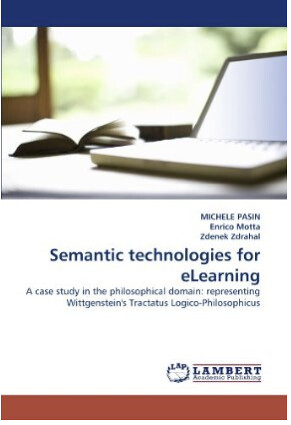Title:
Semantic Technologies for ELearning: A case study in the philosophical domain: representing Wittgenstein's Tractatus Logico-Philosophicus
Year:
2010
Abstract:
What does it mean for a student to come to an understanding of a philosophical standpoint and can the explosion of resources now available on the web support this process, or is it inclined instead to create more confusion? We believe that a possible answer to the problem of finding a means through the morass of information on the web to the philosophical insights it conceals lies in the process of narrative pathway generation. That is, the active linking of resources into a learning path that contextualizes them with respect to one another. This result can be achieved only if the content of the resources is indexed, not just their status as a text document, an image or a video. To this aim, we propose a formal conceptualization of the domain of philosophy, an ontology that would allow the categorization of resources according to a series of pre-agreed content descriptors. Within an e-learning scenario, a teacher could use a tool comprising such an ontology to annotate at various levels of granularity available philosophical materials, and let the students explore this semantic space in an unsupervised manner, according to pre-defined narrative pathways.
Full reference:
See also:
2017
paper Fitting Personal Interpretation with the Semantic Web: lessons learned from Pliny
Digital Humanities Quarterly, Jan 2017. Volume 11 Number 1
2014
International Semantic Web Conference (ISWC-14), Riva del Garda, Italy, Oct 2014.
2013
New Perspectives on Medieval Scotland: 1093-1286, Woodbridge, Suffolk: Boydell and Brewer, Studies in Celtic History Series, Aug 2013.
paper Fitting Personal Interpretations with the Semantic Web
Digital Humanities 2013, University of Nebraska–Lincoln, Jul 2013.
2011
paper Semantic Web Approaches in Digital History: an Introduction
Lecture slides from the Course on digital history, part of the master in Digital Humanities at King's College, London., Oct 2011.
paper Ontological Requirements for Annotation and Navigation of Philosophical Resources
Synthese, Volume 182, Number 2, Springer, Jan 2011.
2010
LAP LAMBERT Academic Publishing, Aug 2010.
2009
paper Ontological Requirement for Supporting Smart Navigation of Philosophical Resources
PhD Thesis, Milton Keynes, UK, The Open University, Jul 2009.
2008
paper Formalizing ʻphilosophicalʼ narratives: the tension between form and content
European Computing and Philosophy Conference (ECAP08), Montpellier, France, Jun 2008.
2007
paper AquaLog: An ontology-driven question answering system for organizational semantic intranets
Journal of Web Semantics, Sep 2007. Vol. 5, 2, (72-105), Elsevier
paper PhiloSURFical: browse Wittgensteinʼs Tractatus with the Semantic Web
Wittgenstein and the Philosophy of Information - Proceedings of the 30th International Ludwig Wittgenstein Symposium, Kirchberg, Austria, Aug 2007. pp. 319-335
paper Supporting Philosophers’ Work through the Semantic Web: Ontological Issues
Fifth International Workshop on Ontologies and Semantic Web for E-Learning (SWEL-07), held in conjunction with AIED-07, Marina Del Rey, California, USA, Jul 2007.
2006
paper An ontology for the description and navigation through philosophical resources
European Conference on Philosophy and Computing (ECAP-06), Trondheim, Norway, Jun 2006.
paper A Task Based Approach to Support Situating Learning for the Semantic Web
International Workshop on Applications of Semantic Web Technologies for E-Learning (SWEL-06), held in conjunction with Adaptive Hypermedia 2006, Dublin, Ireland, Jun 2006.
Poster paper presented at the 3rd European Semantic Web Conference (ESWC-06), Budva, Montenegro, Jun 2006.
2005
paper Semantic Learning Narratives
International Workshop on Applications of Semantic Web Technologies for E-Learning (SWEL-05), held in conjunction with KCAP-05, Banff, Canada, Oct 2005.
paper AquaLog A Ontology-portable Question Answering interface for the Semantic Web
2nd European Semantic Web Conference (ESWC05), Heraklion, Crete, Greece, May 2005. pp. 546-562
